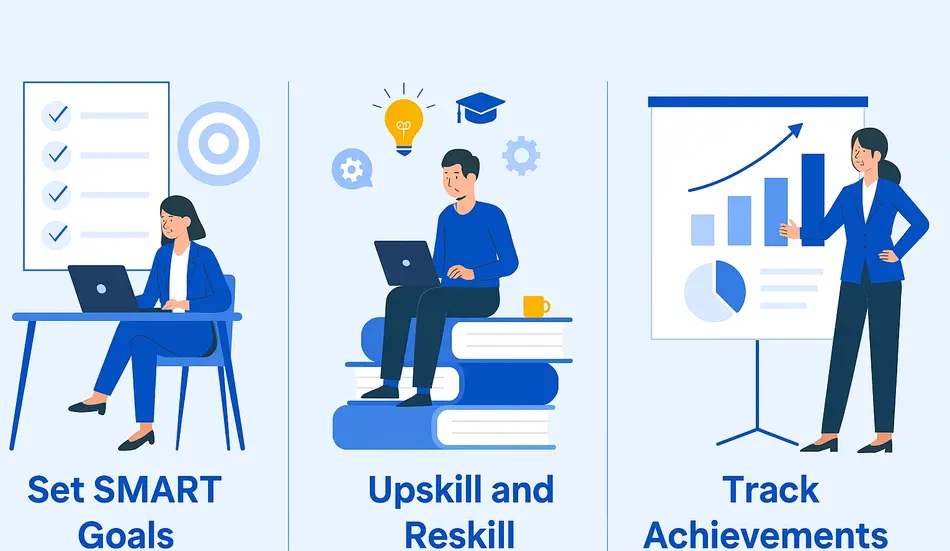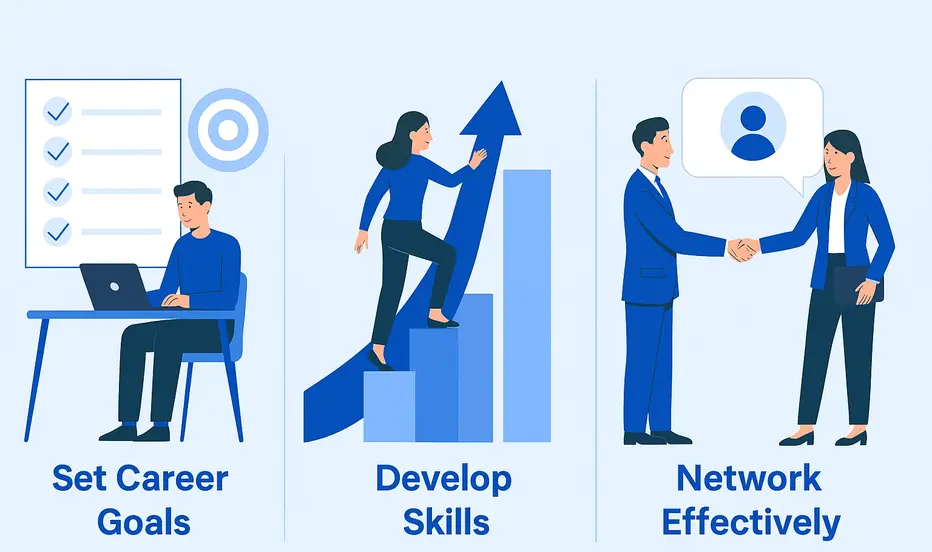Introduction
Whether you’re feeling stuck in your current role or simply ambitious to achieve more, taking the next step up in your career can be both exciting and daunting. Career progression isn’t just about working harder — it’s about working smarter, positioning yourself strategically, and continuously improving.
This comprehensive guide is designed for professionals in the UK who are ready to elevate their careers. From identifying growth opportunities to mastering performance reviews and securing promotions, this article will walk you through actionable strategies, real-world examples, and tools to help you climb the career ladder with confidence and clarity.
Table of Contents
Understanding Career Progression
Career progression refers to the advancement of one’s professional journey — moving from one role to another with increased responsibility, better remuneration, and greater impact. It encompasses various aspects including promotions, skill development, and job transitions.
Why It Matters
- Increased Job Satisfaction: A sense of achievement and growth.
- Higher Earnings: Promotions often come with pay increases.
- Stronger Job Security: Upward movement signals value to employers.
- Professional Recognition: Enhances reputation and future prospects.
Career advancement isn’t limited to climbing the traditional corporate ladder. It includes lateral moves that build experience, switching sectors for better opportunities, or gaining qualifications that open new doors.
Step-by-Step Guide to Moving Up
1. Conduct a Career Self-Assessment
Use tools like SWOT analysis or CareerPlanner.com to identify your current position, competencies, and gaps. Reflect on:
- Strengths and weaknesses
- Skill relevance to market demand
- Long-term aspirations
2. Set SMART Career Goals
Create clear, actionable objectives:
- Specific: “Become a Senior Analyst.”
- Measurable: “Lead two new projects in six months.”
- Achievable: Based on current performance.
- Relevant: Aligned with career vision.
- Time-bound: “By Q4 of next year.”
3. Upskill and Reskill
Use UK platforms like:
Recommended areas: project management, data analytics, leadership, communication.
4. Find a Mentor or Coach
Mentors provide:
- Industry insights
- Constructive feedback
- Networking connections
Explore CIPD.co.uk or in-house mentorship programmes.

5. Document Achievements and Metrics
Maintain a performance portfolio:
- Key project outcomes
- Revenue or cost metrics
- Positive client/stakeholder feedback
6. Master the Art of Self-Advocacy
Effectively communicate your value:
- Showcase achievements confidently
- Align with business goals
- Choose timing wisely (e.g., review cycles)
7. Leverage Internal and External Opportunities
Explore internal job boards and external platforms like WhatJobs.com. Stay open to lateral roles or new sectors.
Common Pitfalls to Avoid
1. Waiting for Recognition
Make your value known through check-ins and self-advocacy.
2. Lack of Networking
Build relationships across departments to increase visibility.
3. Fear of Change
Growth requires taking calculated risks and embracing discomfort.
4. Overconfidence Without Results
Back confidence with measurable outcomes and consistent feedback.
5. Neglecting Soft Skills
Develop emotional intelligence, communication, and leadership presence.

Illustrative Examples & Case Studies
Sophie – Internal Promotion
Promoted from Marketing Executive to Senior Manager after documenting performance, completing leadership training, and taking initiative.
James – Career Shift
Transitioned from accounting to fintech Business Analyst through upskilling in data analytics and proactive LinkedIn outreach.
Amira – Internal Networking
Moved from customer service to HR by engaging in mentorship programmes and attending internal workshops.
Credible Resources and Tools
- Prospects.ac.uk: Career profiles and planning tools
- National Careers Service: UK-based skill and job guidance
- CIPD.co.uk: HR and L&D resources
Tools:
- Trello or Notion – goal tracking
- Grammarly – professional writing
- WhatJobs.com – UK job search engine
Conclusion and Call to Action
Climbing the career ladder is about making deliberate, strategic moves:
- Conduct honest assessments
- Set SMART goals
- Upskill continuously
- Track achievements
- Cultivate professional networks
Explore career advice, job listings, and growth tools on WhatJobs.com/info/career-advice or subscribe to our newsletter for exclusive career insights tailored to UK professionals.
Your next promotion is waiting. Let’s go get it!
Want to advance your career in the UK? Learn how to take the next step up with practical strategies including SMART goal-setting, continuous upskilling, internal networking, and performance tracking. Understand what to say when asking for a promotion and avoid common pitfalls such as waiting passively for recognition. Explore tools, real-world case studies, and top resources like WhatJobs.com/info/career-advice to navigate your career journey confidently.
Frequently Asked Questions (FAQ)
How long does it typically take to get promoted in a UK company?
In the UK, promotion timelines vary depending on industry, role complexity, and individual performance. On average, employees are promoted every 2–4 years, but this can be accelerated with continuous learning, exceptional performance, and strategic networking. Companies with structured development programs may offer faster progression for high-potential employees. However, in smaller firms, promotions may be less frequent due to limited hierarchical layers. It’s important to proactively set career goals, seek feedback, and express your ambitions during performance reviews. Being transparent about your aspirations and taking initiative to expand responsibilities can shorten the typical wait time for career advancement.
What are the best online platforms to upskill for UK professionals?
Several online learning platforms are highly regarded in the UK for professional development. FutureLearn, developed by UK universities, offers industry-relevant courses. LinkedIn Learning provides extensive video tutorials across a wide range of subjects. OpenLearn from The Open University offers free accredited learning. Coursera partners with top universities to deliver certifications in leadership, project management, and tech skills. These platforms often align with UK market demands, offering CPD-accredited content, which employers recognise. Choosing courses relevant to your field and tracking completion in your CV or LinkedIn profile can boost your promotion prospects significantly.
How can I effectively network within my organisation?
Internal networking is essential for visibility and career progression. Begin by attending team meetings beyond your department and volunteering for cross-functional projects. Take advantage of mentorship programs and employee resource groups to build relationships with senior leaders. Regularly update colleagues on your work progress and success stories during informal chats or team briefings. Offering support to peers on their initiatives fosters mutual respect and opens doors to collaborations. Requesting informational interviews with leaders from different departments can also deepen your understanding of the business. Ultimately, consistent, positive visibility makes you a top-of-mind candidate for upcoming opportunities.
What should I say when asking for a promotion?
When asking for a promotion, prepare a clear, evidence-based case. Start by scheduling a dedicated meeting with your manager, rather than raising the topic spontaneously. Highlight key achievements with quantifiable results, such as revenue contributions or project successes. Explain how your role has evolved and how you’ve taken on responsibilities beyond your current job description. Align your growth with the company’s strategic objectives and demonstrate how you’ll add continued value in a higher role. End by expressing your enthusiasm for further development and invite feedback on what’s needed to secure the promotion. Confidence and timing are critical to success.






